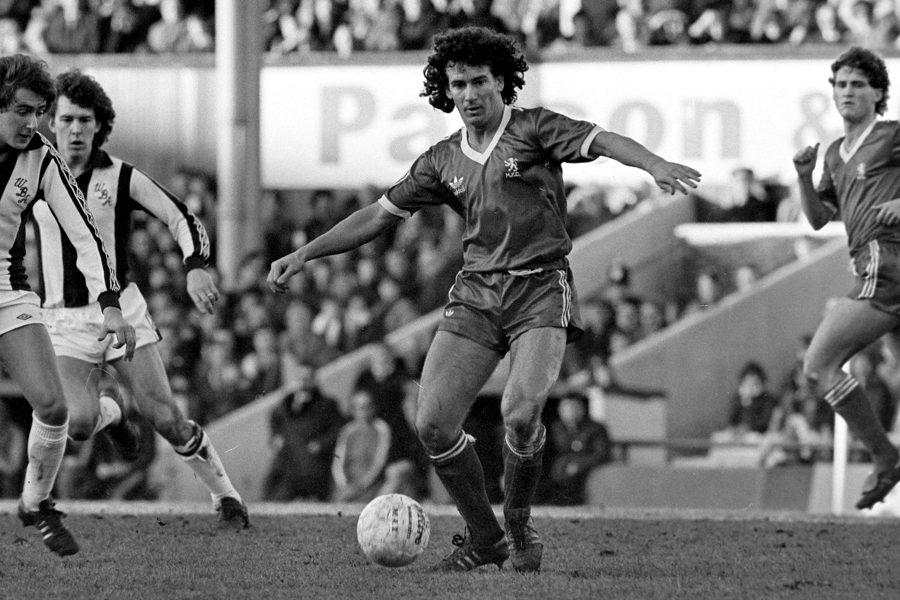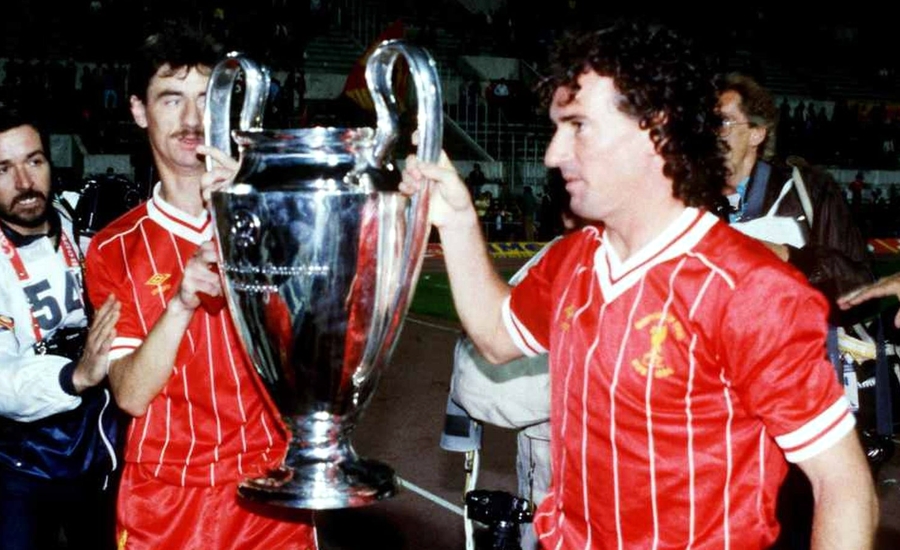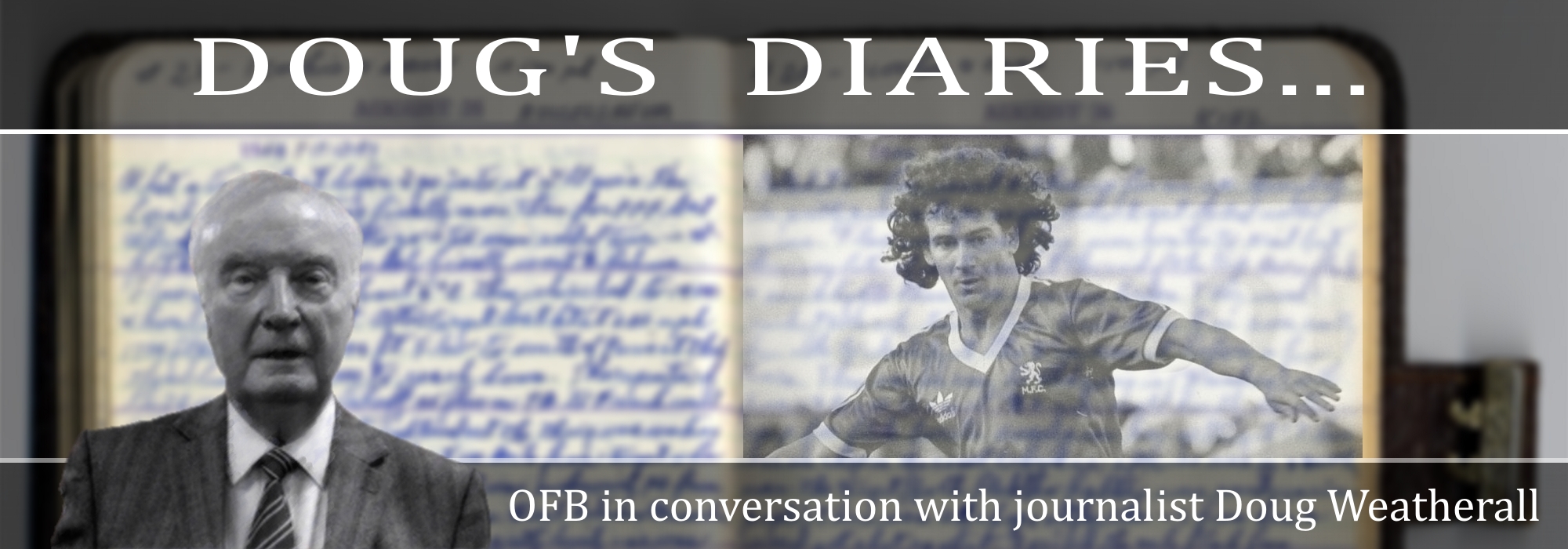Original Fat Bob has again met up with award winning columnist, broadcaster and journalist Doug Weatherall, as they delve once more into his diaries to reveal previously untold facts and intimate stories that bring back to life what it was like to meet footballing heroes and be part of the footballing community. This Diary posted on our blog, is a view on the life and career of Craig Johnston…
When discussing with Doug whom we should feature for the diary extract for our Diasboro article, the name Craig Johnston came to the fore. Doug still calls him “a mate”. The story enshrined in Boro folklore is, that whilst Craig was trying to get into the first team, he started playing “keepy up” with a football in front of the great Bobby Murdoch who was his coach. Bobby threw him a tennis ball and said. “when you can do that with a tennis ball then I’ll consider it.” Craig then practised and demonstrated his skill to Bobby, who true to his word played Craig in the Boro first team.
I met Craig Johnston, who was affectionately called ‘Roo’ (as in Kanga-roo) by his team-mates, shortly after he came to the Boro as a fit tanned youth. He found himself in a strange country, with people who spoke a different dialect of the English Language to what he was accustomed and the weather was always freezing. I refereed him whilst he was an apprentice, as part of the three-man team who used to do all the Boro junior games for Harold Shepherdson. Craig’s contemporaries at that time included Mark Proctor and David Hodgson, whom I still see to this day.

Craig Johnson made his debut for Boro in 1978 at the age of 17 in an FA Cup tie against Everton and went on to make 64 appearances for the club
The Diary Opened…
OFB: What do you remember most about him?
DW: A good question because he was such a one-off. In all my years covering football and, indeed, other sports I never came across anyone quite like him. I hasten to add that my comment is meant as a compliment.
From first hearing about this teenager, it was clear he was far from, a run-of-the-mill footballer. Even though he lived in Australia, he had the initiative to write to some English League clubs, suggesting they grant him a trial. Happily, for him, but mostly for Middlesbrough, the Boro were among the few clubs, even to reply. And Craig was delighted that it was a positive response. The answer was Yes.
Now Craig was so well educated, he was expected to study for a top profession like medicine or teaching. Yet his Mum and Dad so backed his hope of being a professional footballer that they sold their home to finance his air trip from the Antipodes.
As a player, his Dad had trials at Preston North End and Dundee United. Having taken up the game with Lake Macquarie City FC in Newcastle, New South Wales, Craig, aged only 14, came over to England unaccompanied.
OFB: His background wasn’t typical, either, was it?
DW: That’s right. Although his parents were Australian he was born in Johannesburg, South Africa, on June 25 1960. It meant that though he eventually played for England’s under-21s he could have opted to play for other countries. While he was still small the family were back in Australia. Considering the footballing career, he was to enjoy, it’s remarkable considering that he was only six when he contracted osteomyelitis and could have lost a leg. His career was saved due to the expertise of an American specialist, who happened to be lecturing then Down Under and treated Craig successfully.
OFB: Did you read him about him first, or did you see him?
DW: His youth and initiative made him the subject of a good story, so it was natural to seek it. Happily, we got on pretty well from the start, so much so, that, unlike so many players these days, he wasn’t loathe to telephoning scribes like me for a chat. Sometimes I’d not be at home, so he’d have a pleasant conversation with my wife, Edna. I remember he told her how he kept feeling cold in England.
OFB: Was he instantly recognizable as a footballer who was destined for greatness?
DW: It would be stretching things to say he headed towards greatness. But I was always taken by his work ethic. He would run and chase for 90-plus minutes and while he was a good tackler himself, he could also take a tackle without complaining
OFB: Did he try and emulate his style of play on any individual player who played in his position?
DW: I wasn’t aware that he did, but he’d have been a good model himself for aspiring young players.
OFB: When did you become friends?
DW: It was whilst a John Neal Boro team was preparing in Jersey for a Cup tie that I got to know Craig even better. Without trying he also provided one of the most unusual stories I’ve reported.
The Boro party and we Pressmen stayed at the Pomme D’or Hotel in St. Helier. The English Channel is just across the road and, at low tide, it was easy to stroll across a long stretch of sand to get to a wee island. Craig did just that and, relaxing on a sunny afternoon, he dozed off. When he awoke, it was to look across at a lot of sea water between him and back to the safety of his hotel. There was only one thing for Craig to do. He’d have to swim back to land, still wearing clothes, of course and that he did!
Craig, of course, had swum a lot near his Aussie home. It was a tale that I was delighted to dictate for the next day’s Daily Mail. Mind you, at least one of his Boro team-mates doubted the veracity of what Craig had recounted. That player would mutter, “Jackanory, Jackanory…” A fairy tale? It certainly wasn’t.
OFB: Was there anything else about Craig’s make-up which surprised or amused you?
DW: Definitely. He was a good mimic. He obviously heard me broadcasting on BBC radio and/or TV because it was amazing how accurately he imitated my Durham accent as I’d often describe a Gary Rowell goal for Sunderland!
OFB: Did he disappoint you at all?
DW: No; it was Boro themselves who disappointed me when they sold him to Liverpool. I was always saddened when the so-called Big Three of North-East Soccer felt obliged to sell good players. That happened far too much in my career.
Craig had made his Boro first-team debut in an FA Cup-tie with Everton and, mainly as a midfielder, had scored 16 goals in 64 appearances before a £650,000 move to Liverpool in 1981.
OFB: But, of course, he had a great career at Anfield, didn’t he?
DW: Not half! As mainly a right-side midfielder, between 1981 and 1988 he won five League Championship medals, two League Cup medals, a Charity Shield medal and was also a European Cup winner.

Craig Johnson had a successful career at Liverpool and won 8 trophies including the European Cup in 1984, which he is pictured with Ian Rush lifting
OFB: So, when he went to Liverpool, the Anfield fans took to him?
DW: Again, not half! They nicknamed him Skippy and he was clearly a crowd favourite. This versatile lad also wrote the club’s Cup final song, “Anfield Rap.”
He had made 271 appearances and scored 40 goals when he angered manager Kenny Dalglish by announcing his premature retirement from Liverpool. Dalglish then relented and gave his blessing when learning that Johnson’s sister was seriously ill after a serious accident in Morocco. She needed constant attention back home in Australia and Craig wanted to provide that and flew back to Australia.
A year after he left Liverpool he raised funds in Australia and flew back to England to attend funerals and memorial services after the Hillsborough disaster. He also dedicated his autobiography, “Walk Alone”, to victims of the Heysel and Hillsborough disasters.
A business career followed his football. He created the prototype for the Predator Football Boot. The innovator however went bankrupt and he was even temporarily homeless, before forging a new career as a photographer.
He’s 58 now and I’ll always have fond memories of him.
OFB: Thank you Doug for opening another page in your impressive Diary about a player whom I will always remember and appreciate the time he spent at the Boro.
